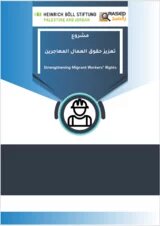The reality of migrant workers in Jordan
A robust research methodology was implemented, involving 10 structured interviews with political parties to understand their perspectives on migrant labor, 12 semi-structured interviews with migrant workers to document their experiences, and consultations with parliamentarians, labor unions, and civil society organizations. These efforts culminated in a comprehensive policy paper that outlined critical challenges and proposed reforms. The policy paper was validated and refined during a high-profile launching session attended by over 50 stakeholders, including parliamentarians, labor union representatives, CSOs, and migrant workers. Additionally, three regional advocacy sessions were held in Aqaba, Sahab (Amman), and Irbid, involving local stakeholders such as labor directors, elected officials, and CSOs, to garner support for the proposed recommendations.
The findings highlighted significant gaps in the legal framework, particularly for agricultural and domestic workers, and the restrictive nature of the Kafala system, which limits workers' freedom and exposes them to exploitation. Issues such as inadequate wages, substandard housing, limited healthcare access, and barriers to justice further compounded the challenges faced by migrant workers.
